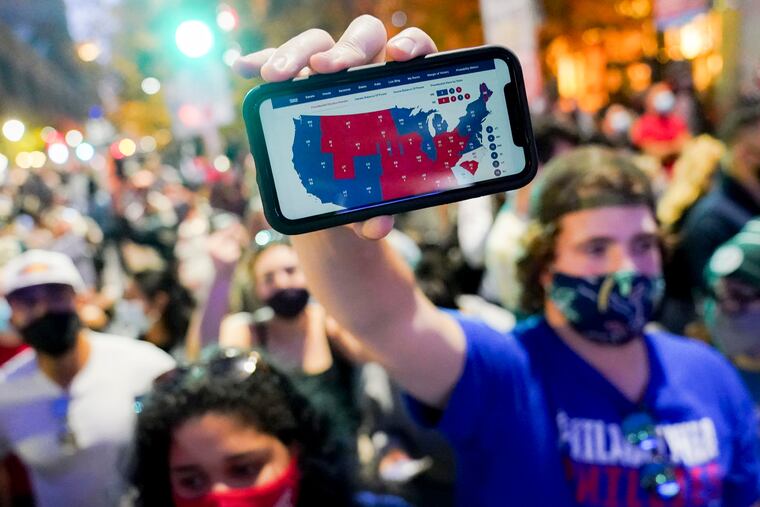Pennsylvania was home to America’s first and only ‘faithless elector’ in 1796 | Opinion
Samuel Miles pledged to vote for John Adams but ended up voting for his rival, Thomas Jefferson.

Joe Biden is on track to win the election for Pennsylvania’s 20 crucial Electoral College votes by a relatively comfortable margin when all the votes are counted. But President Donald Trump’s incendiary and baseless rhetoric claiming, without any proof, that the statewide election was riddled with fraud has led to reports that pressure has begun mounting on the Republican-led Pennsylvania legislature to overturn the popular vote and appoint their own electors for Trump. Or, failing that, some think that so-called “faithless electors” could step in and switch their votes from Biden to Trump when the Electoral College meets in December.
Earlier this spring, I argued one of a pair of Supreme Court cases that were the first in over 50 years to directly address the role of presidential electors in our system. Let me cut right to the chase: The system of electing the president through the Electoral College is imperfect, but it is not so broken that the will of the voters can be so easily thrown out.
» READ MORE: Should America ditch the Electoral College once and for all? | Pro/Con
My colleagues and I brought our case in the spring because we realized that, in more than 200 years, the Supreme Court had never definitively said that presidential electors must follow the will of the voters. The Supreme Court was able to stay silent all these years because the issue has always been mostly a historical curiosity. An unusual vote or two in the Electoral College has never swung an election, for instance. In fact, only one presidential elector in U.S. history has ever swung from being expected to vote for one major party candidate to voting for the other. Interestingly enough, that was a Pennsylvanian named Samuel Miles, who in 1796 pledged to vote for John Adams but ended up voting for his rival, Thomas Jefferson. That swing hasn’t happened since.
Earlier this year, the Supreme Court at last definitively and unanimously ruled that there can never be another Samuel Miles. While the court acknowledged some uncertainty on this issue in America’s early history, it noted that “long settled and established practice” has led to the conclusion that “electors are not free agents,” but must “vote for the candidate whom the State’s voters have chosen.” At the end of the opinion, the Supreme Court put it even more simply by stating here in America, when it comes to picking the president, “We the People rule.”
Trump’s campaign to overturn the popular vote would have Pennsylvania reach the opposite conclusion and instead not “We the People rule,” but we the politicians, or even we the (mostly unknown) members of the Electoral College. Nothing could be more offensive to our constitutional tradition. Under the Constitution, the state legislature got to pick how electors are chosen, and it chose to hold an election by popular vote, as every other state has done for over a century.
Once that choice was made, as the Supreme Court recognized, it is not for anyone to interfere with that choice — not the state legislatures, and certainly not the electors. To attempt to undermine the will of the people by manipulating the appointment of electors or how they vote would be to subvert the text and intent of our founding document. It can’t happen in our constitutional system.
» READ MORE: Is it treason? As Trump denies election results, legal scholar unpacks his attempt to stay in office | Opinion
It is true that, as a technical legal matter, presidential electors in Pennsylvania are not bound by state law to vote for the winner of the state’s popular vote, though they are bound in many other states. But that’s irrelevant to whether electors can and should undermine the will of the people. During our Supreme Court case, Pennsylvania joined a brief on behalf of 44 states stating that such laws aren’t strictly necessary because “custom and practice have dictated that electors honor the electorate’s and prevailing party’s will and cast their votes for the presidential ticket that won the statewide popular vote.”
The attorneys general of every other key state signed onto that bipartisan statement, too, including the leaders of Michigan, Wisconsin, Nevada, Arizona, and Georgia. Those states all said that the “electorate’s will” must be followed, and the Supreme Court agreed. There is no reason to think they can go back on their word now, just to indulge the president’s unfounded, unproven claims about voter fraud.
» READ MORE: Why the term ‘legal votes’ is racist | The Angry Grammarian
Of course, it should be unthinkable for Pennsylvanians of any political party even to consider such an extraordinary maneuver as undermining the will of the people. This election should be over except for the crossing of T’s and the dotting of I’s. Sadly, some are at least thinking of these extraordinary moves. But don’t lose too much sleep over it because it can’t happen here. The Supreme Court already said so. Repeat after me: We the People rule.
Jason Harrow is a Supreme Court elections lawyer and chief legal counsel for Equal Citizens, who earlier this spring argued the first U.S. Supreme Court case in 50 years to definitively address presidential electors.